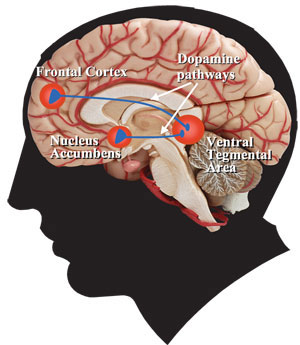NIDA Brings "The Science of Addiction" to Times Square
Starting September 14, 2004, visitors can add the cerebral cortex and limbic system to the list of theaters, shops, and famous music sites to explore in Times Square, New York City. NIDA presents "The Science of Addiction"—a display that describes the brain and how it works, the consequences of drugs on brain and , and facts about commonly abused drugs—at One Times Square through February 1, 2005.
The display is part of Target America: Drug Traffickers, Terrorists and You, an exhibit coordinated by the Drug Enforcement Administration (DEA) Museum Foundation that shows the harmful effects of illicit drugs at the societal and personal levels. Comprising contributions from private and public partners—including DEA, the Office of National Drug Control Policy, the Substance Abuse and Mental Health Services Administration, the State Department's Bureau of International Narcotics and Law Enforcement Affairs, and the National Guard—the exhibit presents information on illicit drug production and trafficking, links with other criminal activities, the impact of drug abuse on home and workplace, and the latest science on the disease of addiction.

On the exhibit's entrance floor, visitors can explore topics covered by DEA; NIDA's display is located on the second floor. The exhibit also features the "Memorial Wall"—a large photomural acknowledging the many people who have lost their lives to drug abuse or addiction. NIDA developed text information and graphics for the mural, which highlights the powerful impact of addiction at the personal level.
Using well-designed graphics, the display guides the viewer through a sequence of logically developed information about drug addiction—from the reasons for taking drugs, to the known risk factors for addiction and the vulnerability of the developing adolescent brain, to factors known to facilitate prevention. A section on treatment highlights the link between scientific discoveries and therapeutic advances and emphasizes the potential of the brain to recover partially from the disease. This section describes NIDA programs that test therapies for addiction in communities and the criminal justice system. Visitors can view the range of free publications provided by the Institute and can obtain information on how to order or download these from the NIDA Web site.
The DEA Museum designed the exhibit with students in mind, but organizers view the educational goal more broadly. Sponsoring organizations can hold seminars, presentations, press conferences, and other events in the third-floor auditorium. Free admission, the Times Square location, and flexible exhibit hours (open 7 days a week from 9 a.m. to 8 p.m.) make Target America: Drug Traffickers, Terrorists and You and "The Science of Addiction" a must-see for anyone who wants to learn about the many-sided consequences of illegal drugs. For more information, contact Exhibit Educator Amy Bloustine at 212-337-1265.
Leader in Drug Abuse and Addiction Research Honored
 Dr. Mary Jeanne Kreek
Dr. Mary Jeanne KreekDr. Mary Jeanne Kreek has been awarded the Columbia College of Physicians & Surgeon's Alumni Gold Medal for Distinguished Achievements in Medicine. Dr. Kreek is the first awardee from the drug addiction research field and the fourth woman to receive this award. She is Professor and Head of the Laboratory of the Biology of Addictive Diseases, Rockefeller University Hospital, The Rockefeller University, and Principal Investigator and Scientific Director of a NIDA Research Center in New York City.
The award cites Dr. Kreek's pivotal work helping more than 2 million former heroin abusers worldwide overcome their addiction. "I was deeply honored to receive this award," says Dr. Kreek. "Forty years ago, we first concluded, contrary to the then-accepted concept, that addiction is a metabolic disease of the brain with behavioral manifestations.
"Over the last 15 years, we have been able to identify many molecular neurobiological changes that are related to the development of specific addictive diseases. During the last 6 years, we have begun to elucidate specific molecular genetic variants that contribute to human addictive diseases." Dr. Kreek concludes, "This work has all been supported by NIDA research grants, for which we are extremely grateful."
A graduate of Wellesley College, Dr. Kreek received her M.D. degree from the Columbia University College of Physicians & Surgeons. She joined the Rockefeller Institute in 1964 and, with Dr. Vincent P. Dole and the late Dr. Marie Nyswander, performed initial studies of methadone for the chronic management of heroin addiction. These studies led to development of the first effective pharmacotherapy for addiction treatment.
